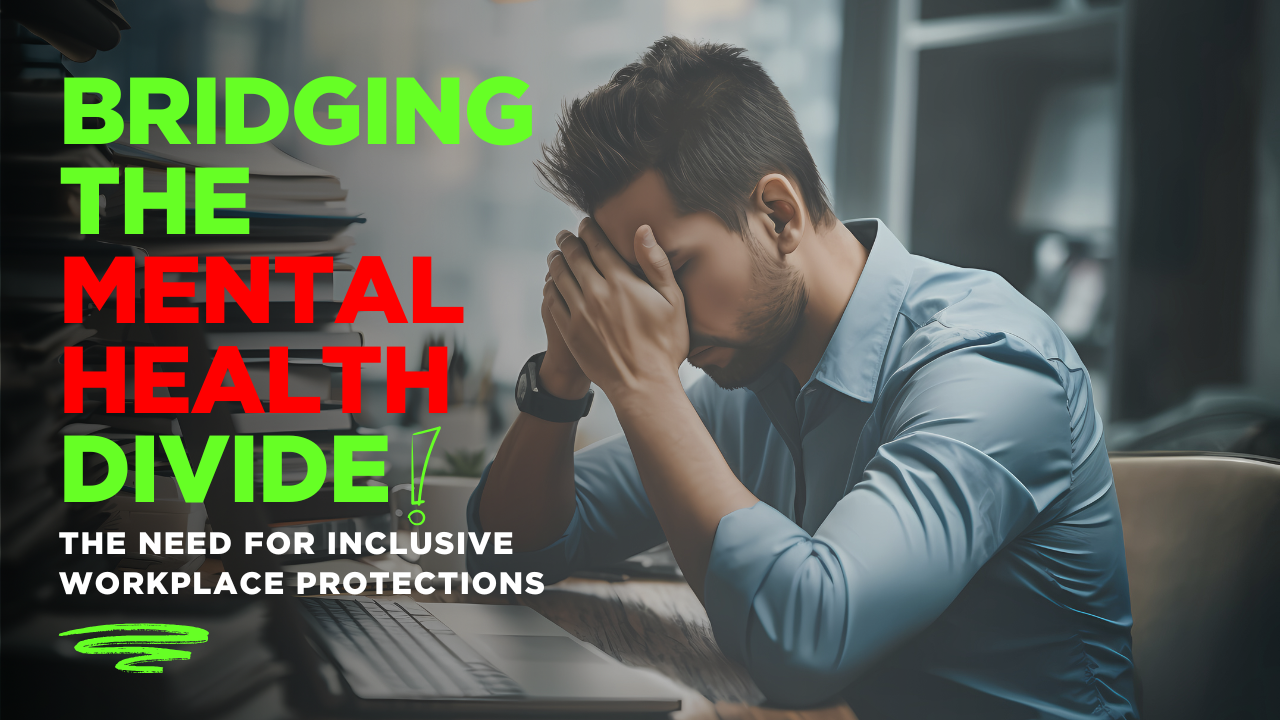Bridging the Mental Health Divide: The Need for Inclusive Workplace Protections
Introduction – Need for Inclusive Workplace Protections
Mental health is an integral component of overall well-being, yet it remains largely neglected in India’s labour laws. While corporate employees in major firms often have access to wellness programmes and counselling services, blue-collar workers—who endure harsher conditions and greater job insecurity—lack the same support structures. The current legal framework fails to acknowledge workplace-induced psychological distress, perpetuating an elitist divide where mental health care is accessible only to those in privileged job sectors.
Despite the increasing recognition of mental health as a workplace concern, policy reforms remain insufficient. The World Health Organization (WHO) has identified workplace stress as a leading global health risk, yet Indian labour laws continue to focus primarily on physical safety. This legal blind spot disproportionately affects blue-collar workers, whose demanding environments and lack of social protections leave them vulnerable to anxiety, depression, and burnout. Bridging this gap requires a shift in both policy and perspective—one that treats mental health as a universal workplace right rather than a privilege afforded only to corporate employees.
Corporate Wellness Initiatives: A Privilege for the Few
In India’s white-collar sectors, particularly in multinational corporations and major technology firms, mental health initiatives have gained traction. Companies such as Infosys and Wipro have launched structured wellness programmes like the HALE (Health Assistance and Lifestyle Enrichment) initiative and ‘Mitra’ programme, which provide counselling services, stress management workshops, and work-life balance interventions. These initiatives reflect a growing corporate awareness that mental well-being directly influences productivity and employee retention.
However, these benefits are not available to the majority of India’s workforce, particularly those in manufacturing, construction, agriculture, and other blue-collar industries. Workers in these fields experience immense physical strain, job insecurity, and harsh working conditions, yet their mental health concerns are routinely overlooked. The very structure of India’s labour laws reinforces this divide by failing to mandate mental health protections for non-corporate sectors.
The Reality for Blue-Collar Workers: Stress Without Support
For blue-collar workers, mental health challenges stem from multiple sources—long and inflexible work hours, low wages, hazardous working conditions, and job insecurity. Many work in high-risk environments, such as factories and construction sites, where physical injuries are common, but the psychological toll of their labour is rarely addressed.
Moreover, government-run mental health initiatives, such as the Tele Manas helpline, while well-intentioned, remain inaccessible to many workers due to a lack of awareness and deep-seated social stigma. Unlike corporate employees who may voluntarily access wellness programmes without fear of repercussions, blue-collar workers are often reluctant to seek help due to fears of job loss, discrimination, or social ostracisation. This disparity highlights a systemic failure to provide equal mental health protections across different employment sectors.
A Focus on Physical Safety, Not Psychological Well-being
India’s labour laws have historically prioritised physical safety over psychological well-being. The Occupational Safety, Health and Working Conditions Code (OSHWC), 2020, defines workplace safety primarily in terms of physical hazards. Although the law mandates that employers provide a safe working environment, the term ‘safety’ is narrowly interpreted, excluding mental health considerations. This omission allows companies to evade responsibility for workplace-induced stress, anxiety, and depression.
Similarly, the Code on Social Security (CSC), 2020, defines ‘employment injury’ in a way that excludes mental health disorders. Workers can claim compensation only for injuries arising from physical accidents or recognised occupational diseases, leaving no recourse for those suffering from work-induced mental distress. In contrast, courts in progressive jurisdictions, such as the United Kingdom, have ruled that workplace stress and anxiety can be considered occupational hazards, entitling affected employees to legal protections.
The Mental Healthcare Act (2017): Progress but No Workplace Provisions
The Mental Healthcare Act (MHCA) of 2017 was a landmark reform that aligned India’s policies with the UN Convention on the Rights of Persons with Disabilities (UNCRPD). It introduced rights-based protections for individuals suffering from mental illness, decriminalised suicide attempts, and aimed to reduce stigma. However, it failed to incorporate workplace-specific mental health protections. Unlike the UK’s Health and Safety at Work Act (1974), which obligates employers to mitigate psychological risks, the MHCA does not impose any duties on organisations to safeguard employee mental well-being.
The absence of legal mandates leaves mental health in the workplace largely unregulated, allowing employers to dismiss psychological distress as a personal issue rather than a structural problem requiring intervention. This legal gap perpetuates workplace cultures where excessive workloads, toxic management, and job insecurity are normalised, with no accountability for the psychological harm inflicted on employees.
Reduced Productivity and Economic Losses
A workforce plagued by anxiety, depression, and chronic stress is inherently less productive. Studies have shown that untreated mental health conditions lead to increased absenteeism, high employee turnover, and diminished efficiency. The World Economic Forum estimates that India will lose $1.03 trillion in economic output due to mental health-related productivity declines between 2012 and 2030.
When workers struggle with stress and burnout, their ability to perform efficiently is compromised. This is particularly true for blue-collar workers in physically demanding jobs, where exhaustion and psychological distress can lead to errors, injuries, and decreased output. Employers who fail to address mental health concerns risk long-term losses, as frequent workforce disruptions and high attrition rates create operational instability.
The Human Cost: Social Isolation and Mental Health Crises
Beyond economic consequences, the neglect of workplace mental health has severe social repercussions. Mental health struggles do not remain confined to the workplace; they extend into workers’ personal lives, affecting relationships, family dynamics, and overall well-being. The stigma surrounding mental illness discourages many from seeking help, exacerbating feelings of isolation and despair.
India already has one of the highest suicide rates in the world, with workplace stress often cited as a contributing factor. In the absence of supportive workplace policies, employees suffering from severe anxiety or depression have limited avenues for intervention, increasing the risk of self-harm and other mental health crises. Addressing this issue requires systemic change—one that integrates mental health protections into labour laws and fosters a culture of psychological safety at work.
Policy Reforms for Inclusive Mental Health Protections
To bridge the glaring disparity in mental health protections between blue-collar and white-collar workers, India’s labour laws must undergo significant reform to explicitly recognise psychological well-being as a fundamental workplace right. The Occupational Safety, Health and Working Conditions Code (OSHWC) and the Code on Social Security (CSC) must be amended to include mental health risks within their occupational safety mandates, ensuring that psychological distress is treated with the same urgency as physical injuries. This would require expanding the definition of ‘employment injury’ to encompass stress, anxiety, and depression caused by workplace conditions, allowing affected employees to claim compensation and legal protection.
Employers, regardless of industry, should be mandated to conduct regular mental health risk assessments, implement structured support systems, and provide accessible counselling services to mitigate workplace stress. Workplace accommodations, such as flexible work arrangements, mandatory rest periods, and stress leave policies, should become a legal requirement rather than an optional corporate initiative reserved for high-paying jobs. Without these structural changes, blue-collar workers will remain excluded from the mental health discourse, forced to endure toxic work conditions with no formal recourse.
Additionally, a legal framework must be established to hold employers accountable for fostering a psychologically safe work environment. Anti-discrimination provisions should be introduced to ensure that workers suffering from mental health issues are not penalised, demoted, or dismissed for seeking help. Just as physical disabilities receive workplace accommodations, mental health conditions must be acknowledged and addressed through employer obligations.
Moreover, awareness and education campaigns must be integrated into both government and corporate initiatives to dismantle the stigma surrounding mental health, particularly among blue-collar workers who may hesitate to seek support due to cultural and financial barriers. Enforcement mechanisms, including penalties for non-compliance, should be instituted to prevent businesses from treating mental well-being as an afterthought. Ultimately, these reforms would not only create a more equitable work environment but also enhance national productivity, reduce burnout-related absenteeism, and promote a workforce that values both economic output and human dignity.
Conclusion
India stands at a turning point in its approach to workplace mental health. The current legal framework fails to protect employees from workplace-induced psychological distress, reinforcing an elitist divide where only white-collar professionals benefit from mental health support. Without urgent reforms, the economic and human costs of neglecting mental well-being will continue to mount. Recognising mental health as a universal workplace right is not just a moral imperative—it is essential for building a healthier, more equitable workforce that prioritises both productivity and human dignity.
Subscribe to our Youtube Channel for more Valuable Content – TheStudyias
Download the App to Subscribe to our Courses – Thestudyias
The Source’s Authority and Ownership of the Article is Claimed By THE STUDY IAS BY MANIKANT SINGH



